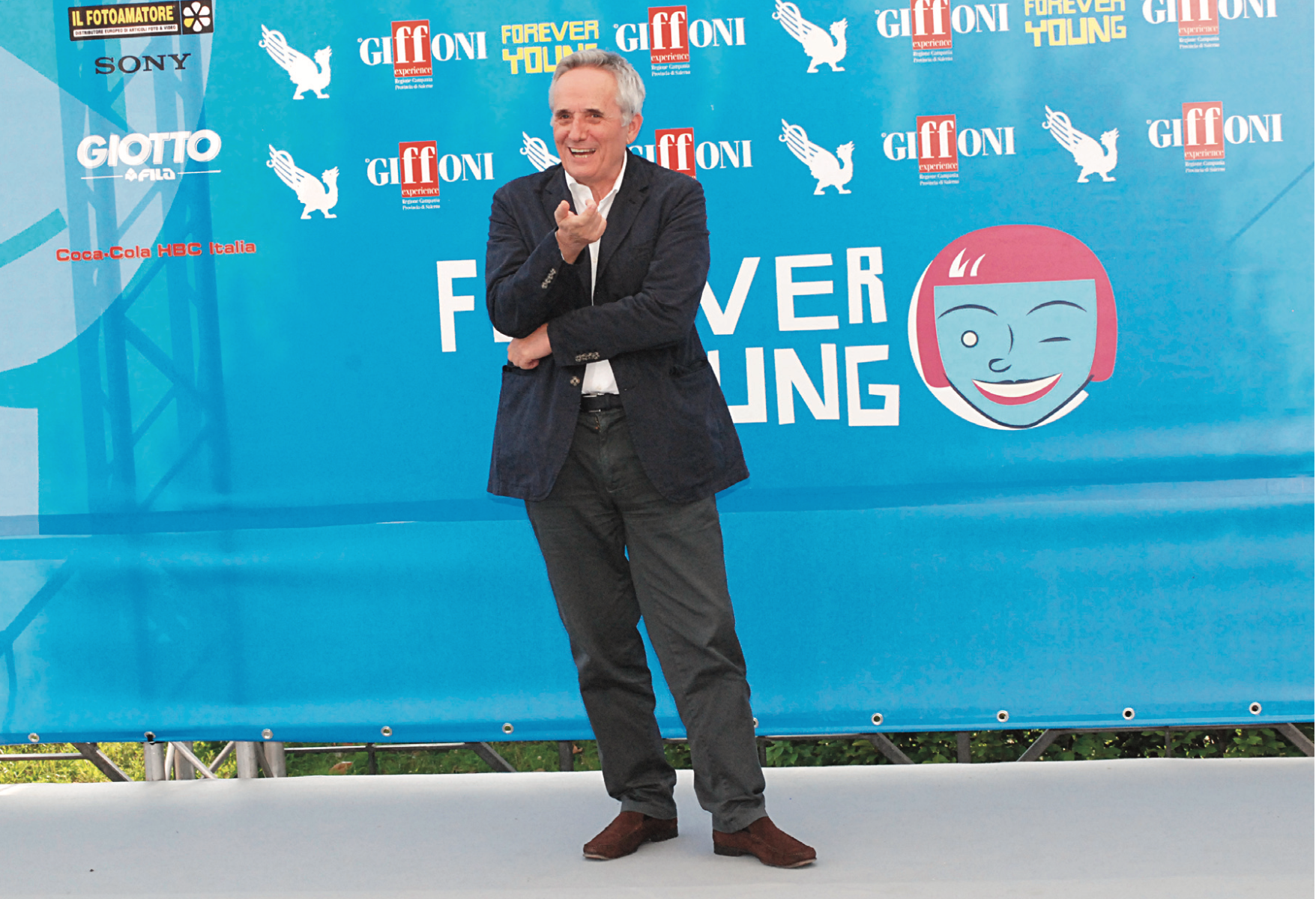“There is a sort of prequel to this movie: it happened when the producer proposed me to direct a film about Tommaso Buscetta. That’s when I began to read and study, to understand a little more about this unusual man.”
That’s how the conversation between director Marco Bellocchio and actor Pierfrancesco Favino took off during an exclusive interview with L’Italo-Americano, recounting the work behind Il Traditore, The Traitor, while on tour around the United States. The movie is also the Italian selection for the 2020 Oscars.
In the ‘80s, Sicily was home to an internal war between mafia gangs and the Corleonesi, led by Totò Riina, only had one purpose: get rid of all families considered enemies. While the number of deaths rose day by day, Tommaso Buscetta, leader of the old Cosa Nostra, was spending his life hidden in Brazil with his third wife, Cristina, and their children. Don Masino’s bella vita ended when the federal police tracked him down and decided to hand him over to the Italian justice.
In Palermo, judge Giovanni Falcone was ready for him to be back, hoping to get precious testimony to break down the criminal mafia apparatus. Buscetta then became, if not a pentito, the first informant to talk about Cosa Nostra’s structure. His direct enemy, at least up until the Capaci massacre, wasn’t Riina but Pippo Calò, who failed to protect his children.
Tommaso Buscetta, the key figure of the movie, was not just the man of the two worlds. Buscetta is remembered as the man who revealed all about Cosa Nostra, about its structure, and its way of operating in Italy and the world, even though he never regretted to having been part of it.
Maestro Bellocchio, what prompted you to talk about Buscetta?
“Through journalists and writers, I began to get passionate about this man who travels around the world, just like me, yet is so different from me. I also traveled a lot, but my life is, perhaps, the opposite of Buscetta’s. Don Masino, the last of 17 children, became part of the mafia very early on, in a war-torn Palermo. He was noticed by some of the gangs and began a brilliant mafia career that he found out to like.”
A particular, unique personality who has attracted the interest of many directors and actors. “When I heard that Mr Bellocchio was shooting a movie about Buscetta, I tried to get his attention,” Favino reveals. “I did a first audition and tried to convince Marco. I already knew enough about Buscetta and one thing that has always fascinated me is that he doesn’t represent the cliché (of a mafia man) we all are used to. For me, he was a unique character because of his diversity. I still wonder why I had that strong desire to play Buscetta, maybe I knew that this role would allow me to show what I am capable of.”
What did you discover you didn’t already know about Buscetta?
“Don Masino is a man where the criminal side of mafia and bourgeois traits — such as being a family man, a person with a sense of nobility and ancient loyalty — coexist,” Favino continues. “Mafia is a sad note for us Italians, nevertheless seeing how he represented some aspects of ‘Italianness’ was surprising and interesting. Buscetta loved stuff for which Italy is well known in the world, such as fashion, music, love, and puts them together in his life, turning them around in a totally personal and unique way.”
Director Bellocchio, speaking of clichés, did you take into account or were you worried about falling into a stereotyped depiction of mafia?
“I didn’t have the problem of distinguishing myself from great examples of American directors and, because of my style of directing, I knew there was no way I would repeat the experiences of other movies. We worked using imagination to tell real events and we worked them out in our own way, with total freedom, unlike La Piovra or movies shot in America, like Il Padrino.”
Buscetta is an ambivalent character, who changes over time: how did you manage this aspect, we asked both.
“It was a very complex movie — Mr Bellocchio admits — because we wanted to avoid the celebration of the character at all costs, and that’s pretty obvious in different scenes. Falcone was able to obtain important information to take down Cosa Nostra from Buscetta, and it is all made explicit through their dialogues. Buscetta was the first of hundreds of informants who followed, thanks to whom Cosa Nostra was brought down.”
On the same note, Mr Favino: “We, as viewers, feel relieved from personal responsibility when we can say that a bad character is different from us. It is easier to think that man is not a loving person, that he doesn’t love his children, or he cannot build friendships. Buscetta built a kind relationship with his guards, just like that between a grandfather and his grandchildren. He built good relations within judges. Thinking of him as an ambivalent character is more useful because, when we know who the bad guy is, we don’t fear him anymore.”
Could you tell us more about the Sicilian context of the movie?
“We spent some time in Sicily, with the aim of avoiding shallowness,” Bellocchio says. “1980s Sicily’s gone, but we managed to experience important things, like listening to those who lived those times. The local language was a crucial, penetrating and important element, thanks also to Sicilian actors and actresses. In addition, it was essential to shoot our main trial scene in the real high security courtroom where it took place.”
Favino adds: “Today’s Sicily is different. Thanks to its young people, it has become a region that wants to stand out, and has been succeeding at it. The movie doesn’t want to be pro-mafia, you don’t get out of the theatre thinking you want to be like them.”
Maestro Bellocchio, what does the movie bring in American theaters that other directors haven’t already brought?
“I believe I bring both facts and our way of looking at this story.” And Favino echoes: “This movie is an absolute novelty because, so far, mafia was exclusively the one told by American movies. In reality, that is the Italian-American mafia to which, not surprisingly, the Sicilian mafia looked with annoyance, especially because of their habits, behaviors, the ostentation of wealth. It was — in a certain sense — considered a sort of imitation of the real mafia. Somehow we have all been fascinated by characters from Il Padrino or Scorsese’s movies. But with this movie that does not happen, because you don’t want to be a mafioso, there is nothing glamorous about it.”
How do you think international audiences will perceive the movie? Do you think some context is missing from the story?
According to Mr Bellocchio, “The focus had to stay on the character, on real elements that bring him together with his environment. Although we used a bit of repertoire scenes, we avoided any romanticism and we went ahead to film a movie that talks about the past.”
Mr Favino adds: “From an historical point of view, mafia was discovered thanks to Buscetta therefore, in order to contextualize it, we would have had to show crimes upon crimes and quick trials. We can say that the contextualization for this story comes through the information we all already know about the mafia, but, it is only because of Buscetta that we know what it really was.”
Before we wrapped up our interview with a good luck wish for what comes next in 2020, we asked which scene makes them most proud or, at least, what’s their favorite.
“For me, the most difficult part, the one where I felt I could easily fall into rhetorics, was the Buscetta-Falcone dialogue. We knew it was not impossible to achieve what we wanted, but it was challenging and I was afraid of getting on to a rhetorical path.”
Favino, instead, favors the scene of Buscetta’s interrogatory during Andreotti’s trial. “It was a complicated scene — he explains —that culminates in fatigue, failure, in the end of a path, and it was necessary to keep intact the dignity of a man who ultimately needs to accept defeat. When I watched it on screen, I found a nice balance, where there was no risk the actor could feel compassion for Buscetta, not even in those circumstances.”

Actor Pierfrancesco Favino plays mafia boss Tommaso Buscetta in The Traitor (Copyright: Dreamstime)
“C’è una pre-storia a questo film ed è quella di un produttore che mi propone di girare un film su Tommaso Buscetta. Così mi son messo a leggere, studiare, capire un pò di più”.
Comincia così la conversazione tra il regista Marco Bellocchio e l’attore Pierfrancesco Favino che, in un’intervista esclusiva a L’Italo-Americano, hanno raccontato il lavoro dietro al film Il Traditore, in occasione del tour in giro per gli Stati Uniti. Il film è anche il candidato italiano in vista degli Oscar del 2020.
Nella Sicilia degli anni Ottanta, va avanti la guerra fra le cosche mafiose e quella dei Corleonesi, guidati da Totò Riina, ha un solo obiettivo: far fuori tutte le famiglie nemiche. Mentre il numero dei morti sale di giorno in giorno, Tommaso Buscetta, capo della vecchia Cosa Nostra, vive nascosto in Brasile insieme alla terza moglie, Cristina, e ai figli. La bella vita di Don Masino finisce quando la polizia federale lo rintraccia e decide di consegnarlo allo Stato italiano. Ad aspettarlo, a Palermo, il giudice Giovanni Falcone che vuole da lui la testimonianza utile a smontare l’apparato criminale mafioso. Buscetta si lascia convincere e diventa, se non il pentito, il primo collaboratore a parlare della struttura di Cosa Nostra. Il suo diretto avversario, almeno fino alla strage di Capaci, non è però Riina ma Pippo Calò che, una volta passato dalla parte del nemico, non ha protetto i suoi figli. Tommaso Buscetta, personaggio chiave del film, non era solo l’uomo dei due mondi. Buscetta è passato alla storia come l’uomo – mai pentito ma collaboratore della giustizia – che ha svelato all’Italia e al mondo cosa fosse Cosa Nostra, la sua struttura e il suo modo di operare.
Maestro Bellocchio, che cosa l’ha spinta a parlare di Buscetta?
“Attraverso giornalisti e scrittori, ho cominciato ad appassionarmi a questo personaggio che gira per il mondo, proprio come me, ma piuttosto diverso da me. Anche io ho viaggiato tanto, ma la mia vita è forse il contrario di quella di Buscetta. Don Masino, ultimo di 17 figli, ha cominciato la sua vita mafiosa prestissimo, in una Palermo devastata dalla guerra. Fu notato da qualcuno della banda e da lì cominciò una carriera mafiosa brillantissima che gli piaceva non poco”.
Un personaggio particolare, unico, che ha attirato l’interesse di non pochi tra registi e attori.
“Quando ho saputo che Bellocchio stava girando un film su Buscetta, ho chiesto di poter essere preso in considerazione” ci svela Favino. “Ho fatto un primo provino e ho provato a convincere Marco. Conoscevo già abbastanza del personaggio Buscetta e una delle cose che mi ha sempre affascinato di lui è che non rappresenta il cliché a cui noi tutti siamo abituati. Per me, era un personaggio unico da raccontare per via della sua diversità. Ancora oggi mi chiedo perché avessi quel forte desiderio di interpretare Buscetta, forse sapevo che questo ruolo mi avrebbe permesso di mostrare tutta una serie di cose che sono in grado di fare”.
Cosa ha scoperto che non sapesse già di Buscetta?
“Don Masino è un uomo in cui convivono l’aspetto criminale dell’uomo di mafia e degli aspetti borghesi, come ad esempio il suo essere un family man, una persona con un senso della lealtà nobile e antico”, continua Favino. “La mafia è per noi italiani una nota dolente, ma riconoscere in lui alcuni aspetti dell’italianità è stato sorprendente e interessante. Buscetta ama aspetti della cultura per cui siamo conosciuti nel mondo, come la moda, la musica, l’amore, e li mette insieme nella sua vita e li declina in maniera del tutto personale e unica”.
Maestro Bellocchio, parlando di cliché, ha tenuto in conto o si è preoccupato di poter cadere nello stereotipo della mafia?
“Non mi son posto il problema di distinguermi da esempi grandiosi come quelli dei registi americani e, per via del modo di lavorare, sapevo che non avrei rischiato di ripetere le esperienze di tanti altri film. Abbiamo lavorato di fantasia ma su fatti realmente accaduti e li abbiamo elaborati a modo nostro, con totale libertà, a differenza de La Piovra o di film girati in America, come Il Padrino.”
Come si viene a capo di un personaggio ambivalente che si trasforma, per così dire, nel corso del tempo, chiediamo a entrambi.
“Si è trattato di un film molto faticoso – ammette Bellocchio – perché abbiamo voluto evitare a tutti i costi la celebrazione del personaggio e in diversi momenti nel film è molto chiaro. Falcone è riuscito ad ottenere da Buscetta elementi importanti per smontare Cosa Nostra ed è tutto esplicitato nei dialoghi. Buscetta è stato solo l’inizio, dopo di che c’è stato uno sfaldamento dell’organizzazione anche per via dei centinaia di pentiti che ne sono seguiti”.
Sulla stessa scia, Favino: “Siamo noi spettatori a sentirci sollevati dalla responsabilità personale nel momento in cui possiamo dire che quel personaggio malvagio è lontano da noi. E’ più facile pensare che quell’uomo non sia una persona affettuosa, che non ami i suoi figli, che non possa tessere relazioni di amicizia. Buscetta ha costruito con la scorta un rapporto di famiglia, tra nonno e nipotini. Aveva costruito relazioni civili dentro il tribunale. Questo personaggio ambivalente serve più a noi perché sappiamo chi è il cattivo e riusciamo così a non avere più di tanto paura”.
Si passa poi a capire un po’ di più del contesto siciliano.
Secondo Bellocchio, “Per un periodo breve, siamo stati in Sicilia, proprio con lo scopo di evitare di cadere in un racconto superficiale. Quella Sicilia non c’è più, abbiamo vissuto esperienze umane tra cui quella di sentir parlare, ascoltare chi ha vissuto quegli anni. La lingua locale è stata l’elemento più penetrante e importante, grazie anche ad attori siciliani che hanno risposto favorevolmente. E, in aggiunta, è stato importante avere la possibilità, che abbiamo subito colto, di girare nella vera aula bunker, che ci ha permesso di ispirarci per la scena del processo.”
E Favino aggiunge: “La Sicilia di oggi è diversa grazie soprattutto ai giovani, c’è una regione che vuole distinguersi e ci sta riuscendo. Il film non vuole essere un film pro-mafia, non si esce dal cinema pensando di voler essere come loro”.
Maestro Bellocchio, che cosa porta nelle sale americane che altri registi non abbiano già portato?
“Io credo di portare sia i fatti che il nostro modo di guardare a questa storia”.
Gli fa eco Favino: “Credo che questo film sia un’assoluta novità perché finora si è pensato che la mafia fosse esclusivamente quella raccontata dal cinema americano. In realtà, quella è la mafia italo-americana a cui, non a caso, la mafia siciliana guardava con fastidio, per le abitudini comportamentali, per l’ostentazione della ricchezza, era in un certo senso considerata una sorta di scimmiottamento della vera mafia. Per questo, sono certo che questo film mostri qualcosa di diverso, in qualche modo tutti siamo stati affascinati dai personaggi de Il Padrino o dei film di Scorsese. Con questo film, invece, ciò non accade perché non si esce dalla sala con la voglia di essere uno di loro, non c’è nulla di glamour nell’essere un mafioso”.
Come pensa che il pubblico internazionale percepirà il film? Pensa che al racconto manchi qualcosa del contesto?
A detta del maestro Bellocchio, “L’interesse doveva rimanere sui personaggi, su elementi reali che mettono insieme il personaggio col suo ambiente. Pur utilizzando un po’ di scene di repertorio, senza nessun atteggiamento romantico, siamo andati avanti in un contesto diverso, per raccontare un film che parla comunque del passato”.
Sulla stessa scia, Favino: “Dal punto di vista storico, la mafia è stata scoperta grazie a Buscetta, per contestualizzare la mafia avremmo dovuto girare scene di continui delitti e processi veloci. Si può dire che la contestualizzazione per questa storia arriva dalle informazioni che tutti noi abbiamo già sulla mafia ma, per via di Buscetta, sappiamo cosa la mafia fosse veramente”.
Prima di chiudere con un in bocca al lupo, abbiamo chiesto quale scena li renda orgogliosi o semplicemente la scena preferita.
“Per me, il pezzo più difficile, per il quale mi rendevo conto che la retorica era a due passi, come del resto il buonismo, è stato il rapporto Buscetta-Falcone. Non è stato impossibile da realizzare come desideravamo, ma ammetto che è stato difficile. E lì, sì, che ho avuto paura di cadere nella retorica”.
Per Favino, invece, la scena dell’interrogatorio del processo Andreotti rimane la preferita. “Era una scena complicata – spiega – perché il racconto della stanchezza, del fallimento, della fine di un percorso, in cui era necessario mantenere intatta la dignità di un uomo che accetta la sconfitta, aveva un pericolo alto. Rivedendola, penso abbia un bell’equilibrio e non cada nel rischio che l’attore possa provare compassione per Buscetta, per via di quello che sta accadendo”.































